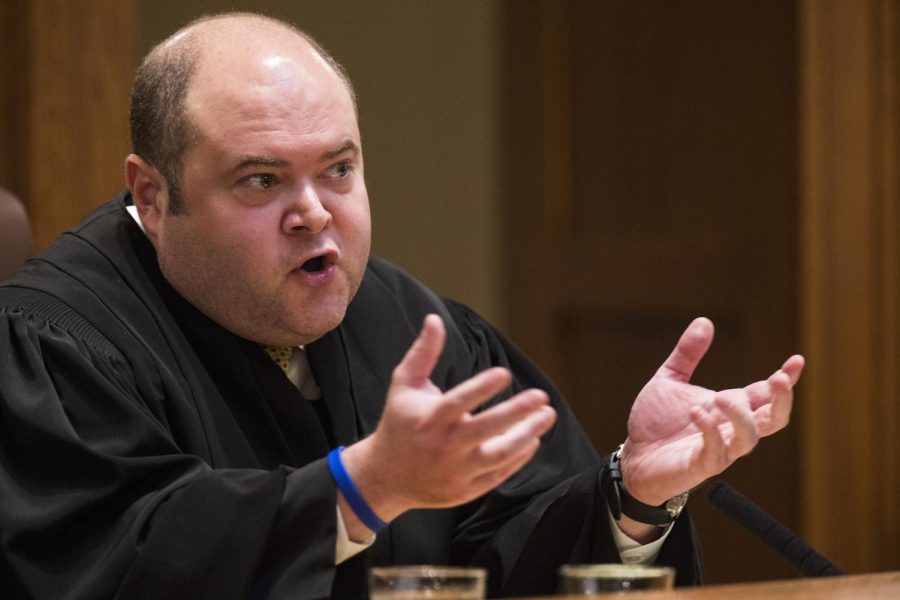Four takeaways from the Supreme Court’s first day of new term
Associate Justice David Stras of the Minnesota Supreme Court speaks during an appeal hearing on the Byron Smith case at the Minnesota Judicial Branch building on Thursday, Sept. 3, 2015 in St. Paul, Minn. Defense attorneys for Byron Smith, who was convicted of killing two teenage intruders in his Little Falls home, filed an appeal with the Minnesota Supreme Court arguing that Smith’s trial was riddled with mistakes from the original indictment, through the trial and right up to the prosecutor’s closing arguments.
October 6, 2015
WASHINGTON The Supreme Court on Monday kicked off its 2015 term with an argument over a Northern California woman who lost both legs in an Austrian railroad accident.
And with that gruesome set of facts, the court’s nine justices began what’s likely to become another momentous term. From the justices’ characteristic behavior to the importance of good lawyering, here are four quick lessons from the famed “first Monday in October”:
Appellate arguments can mask the underlying human drama.
Carol P. Sachs was living in Berkeley, Calif., when she purchased a four-day European rail pass in 2007. While trying to board the train in Innsbruck, Austria, she fell between the tracks. A moving train crushed her legs, both of which had to be amputated above the knee.
But naive listeners to the hourlong oral argument Monday morning, the first of the court’s new term, would not have learned much about Sachs or the trauma she endured. Instead, as is almost always the case at the Supreme Court, the human drama was secondary, if not tertiary, to broader and sometimes arid legal questions.
Specifically, the case centered on whether the Foreign Sovereign Immunity Act blocked Sachs from suing the Austrian rail company. Illustratively, the legal word “gravamen” was mentioned 25 times Monday. The word “legs,” “amputate” and “crush,” among others with flesh-and-blood connotations, were avoided altogether.
The justices still play their customary parts in oral argument.
Justice Ruth Bader Ginsburg may be the oldest member of the court, but she’s also among the feistiest.
The 82-year-old Ginsburg, lovingly dubbed the Notorious R.B.G. by some liberal supporters, showed her durability Monday by being the first justice to ask a question during oral argument. She followed up over the next hour with about 10 more queries, some of them particularly pointed. If Ginsburg wanted to put to rest questions about her fortitude, she succeeded.
Other justices, too, showed some of their familiar characteristics. Justice Stephen Breyer, a famed lover of extended and sometimes abstruse hypotheticals, required about 130 words to unleash one of his questions.
And Justice Clarence Thomas, in keeping with his long-standing practice, was the only one of the nine justices not to speak or ask questions. At times, Thomas was leaning so far back in his chair, seeming to stare at the ceiling, that he could hardly be seen at all.
The Supreme Court is still a tough sell.
The court showed again Monday that few cases make the cut.
The court, of course, makes history with the cases it takes and decides. This term, these pending cases include challenges to affirmative action at the University of Texas, fees mandated by the unions like the California Teachers Association and several death sentences imposed in Kansas.
But more often, the court steers clear, typically taking only about 75 cases out of some 9,000 petitions filed annually.
Even as they issued their first, unremarkable and unsigned opinion of the term Monday, decided without oral argument, the justices swept away more than 1,400 other petitions. The list of rejected petitions, many filed by prisoners, sprawled over more than 50 pages and underscored the long odds against most people seeking Supreme Court review.
Elite lawyering matters more than ever.
Supreme Court advocacy has increasingly been centralized in the hands of relatively few elite lawyers, studies have shown. The first argument Monday offered a hint of why that might be.
Stanford Law School professor Jeffrey L. Fisher, co-director of the school’s Supreme Court Litigation Clinic, argued on Sachs’ behalf. A veteran of more than two dozen prior court arguments, Fisher remained unruffled throughout his 30 minutes at the podium, fielding questions like a Gold Glove third baseman.
“I’m not very knowledgeable,” Breyer told Fisher at one point, “and I tend to believe you’re more knowledgeable, and therefore I’m asking you the question.”
























